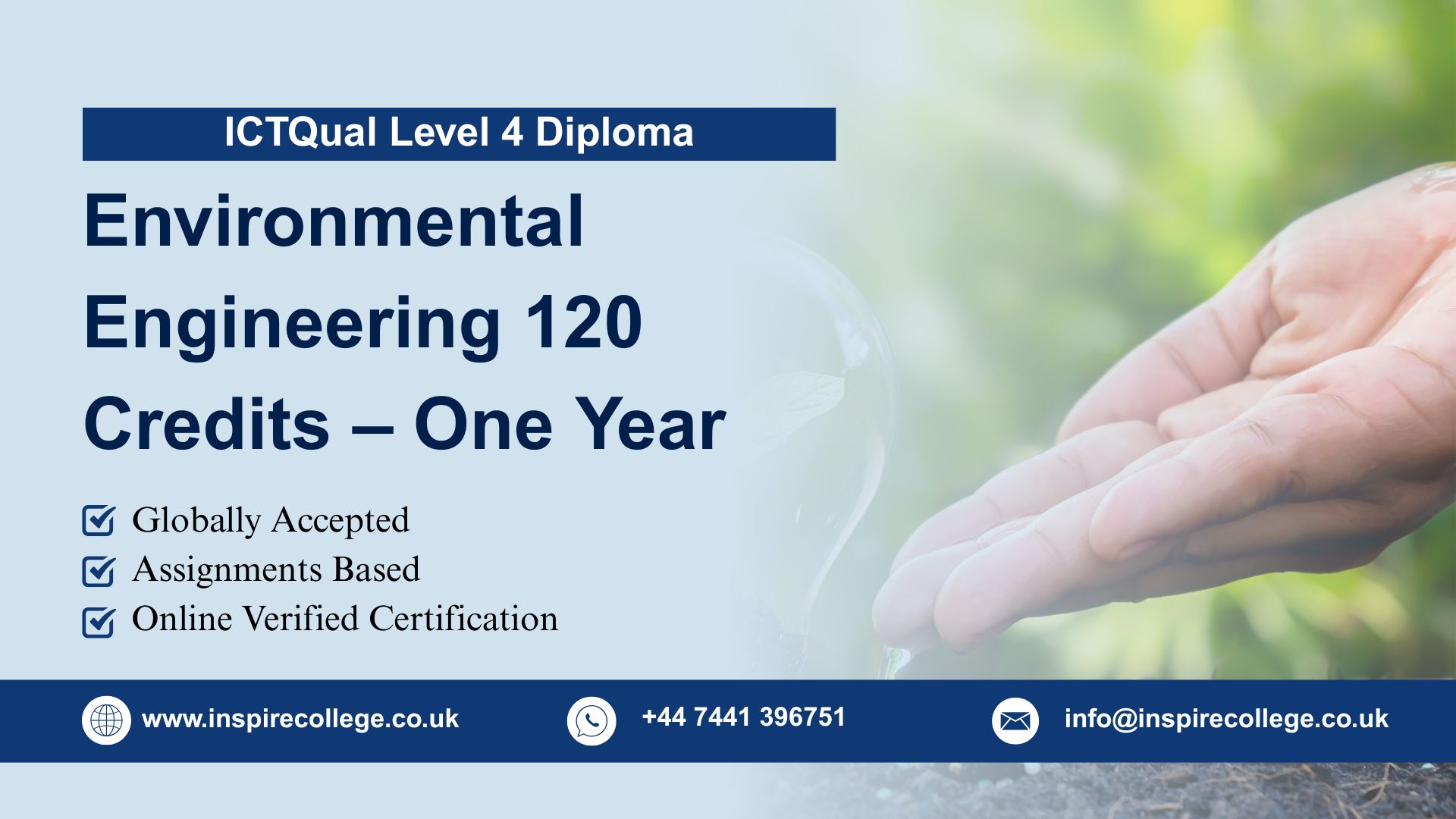
ICTQual Level 4 Diploma in Environmental Engineering 120 Credits – One Year
In today’s rapidly evolving world, environmental sustainability has become a critical concern for businesses, governments, and individuals alike. As the world grapples with issues like climate change, resource depletion, and pollution, the demand for skilled professionals in environmental engineering has never been higher. If you’re passionate about protecting the environment and creating innovative solutions for a sustainable future, the ICTQual Level 4 Diploma in Environmental Engineering (120 Credits – One Year) offers the perfect opportunity to gain the knowledge and skills needed to make a real impact.
Environmental engineers are in high demand in sectors ranging from manufacturing and construction to energy and government. By completing the ICTQual Level 4 Diploma, students can qualify for various roles, including environmental consultant, sustainability engineer, water resource manager, and environmental health officer. With this qualification, you can confidently enter the workforce and contribute to shaping a greener, more sustainable future.
What sets the ICTQual Level 4 Diploma in Environmental Engineering apart is its focus on practical application. Unlike other courses that may lean heavily on theory, this diploma emphasizes the importance of real-world skills. Whether it’s conducting environmental risk assessments or designing sustainable energy systems, students gain the practical expertise they need to thrive in their careers.
Additionally, the ICTQual Level 4 Diploma is designed with a global perspective, ensuring that students are equipped to work on international environmental issues. The curriculum is aligned with current environmental challenges, such as climate change and the global push for sustainable energy, preparing graduates to meet the demands of the modern world.
If you’re looking to make a difference in the world, the ICTQual Level 4 Diploma in Environmental Engineering provides the perfect foundation for a rewarding career in environmental sustainability. With an in-depth curriculum, practical learning opportunities, and career-focused training, this one-year diploma ensures that you are equipped with the skills needed to tackle the environmental challenges of the future. Join the green revolution and contribute to a more sustainable planet by enrolling in the ICTQual Level 4 Diploma in Environmental Engineering today.
- A minimum of a Level 3 qualification (e.g., GCSEs, NVQ Level 3, or equivalent). A solid background in mathematics and basic sciences is highly recommended, as these subjects are fundamental to understanding environmental engineering principles.
- Minimum age of 18 years to enroll in the course.
- Proficiency in English, as the course involves technical terminology, written assignments, and effective communication within an engineering context.
- Basic computer skills, which are advantageous for completing assignments or projects involving simulations, data analysis, or design software.
- While not mandatory, prior exposure to environmental science, sustainability, or related fields can be helpful in understanding course concepts and building practical knowledge.
Mandatory Units
The ICTQual Level 4 Diploma in Environmental Engineering 120 Credits – One Year, achieve the qualification candidates must achieve all of the mandatory units:
Mandatory Units
The ICTQual Level 4 Diploma in Environmental Engineering equips learners with the essential knowledge and practical skills necessary for addressing the critical environmental challenges of today. Upon successful completion of this qualification, learners will be able to demonstrate the following learning outcomes for each study unit:
1. Introduction to Environmental Engineering
- Understand the fundamental principles of environmental engineering and its role in addressing environmental challenges.
- Identify key environmental issues and their impact on ecosystems, human health, and society.
- Demonstrate knowledge of global environmental policies, laws, and regulations that guide environmental engineering practices.
- Explain the importance of sustainability and its integration into engineering design and solutions.
2. Environmental Impact Assessment
- Demonstrate an understanding of environmental impact assessments (EIA) and their importance in project planning.
- Identify and apply methods and tools used in conducting an EIA.
- Evaluate the potential environmental, social, and economic impacts of engineering projects.
- Interpret and comply with legal and ethical considerations involved in environmental assessments.
3. Water and Wastewater Treatment
- Understand the principles and processes involved in water and wastewater treatment.
- Design water treatment systems and identify appropriate treatment technologies.
- Assess the effectiveness and sustainability of wastewater treatment methods.
- Apply environmental regulations in the management of water quality and wastewater discharge.
4. Air Quality and Pollution Control
- Identify the types of air pollutants and their sources.
- Evaluate the impact of air pollution on human health and the environment.
- Understand and apply air pollution control technologies and strategies.
- Monitor and assess air quality and implement corrective measures where necessary.
5. Solid Waste Management and Recycling
- Analyze the principles of sustainable solid waste management and disposal methods.
- Evaluate and apply recycling and waste minimization strategies in various sectors.
- Design and manage waste management systems that comply with environmental regulations.
- Understand the environmental benefits of circular economy principles and their application in waste management.
6. Renewable Energy Systems
- Understand different types of renewable energy sources and their potential environmental impact.
- Evaluate the feasibility and design renewable energy systems for various applications.
- Analyze the integration of renewable energy systems into existing infrastructure.
- Identify the environmental benefits and challenges of renewable energy technologies.
7. Sustainable Engineering Practices
- Understand and apply the principles of sustainable engineering design.
- Evaluate the environmental impacts of engineering projects and apply sustainable practices to mitigate those impacts.
- Implement strategies for energy efficiency, resource conservation, and eco-friendly design.
- Utilize life cycle assessments to support sustainable decision-making in engineering projects.
8. Environmental Regulations and Policies
- Understand the role of environmental policies and regulations in guiding environmental engineering practices.
- Identify and analyze global, regional, and local environmental laws and standards.
- Evaluate the impact of compliance with environmental regulations on engineering projects.
- Apply environmental regulations in the design, implementation, and monitoring of engineering solutions.
9. Climate Change and Environmental Risk Management
- Understand the science of climate change and its environmental, social, and economic impacts.
- Evaluate strategies for mitigating climate change impacts within the engineering context.
- Apply environmental risk management techniques to assess and minimize the impact of climate change on infrastructure.
- Develop and implement adaptation strategies for climate change resilience in environmental engineering projects.
10. Soil and Groundwater Contamination
- Understand the causes, types, and effects of soil and groundwater contamination.
- Assess the risks associated with soil and water pollution and their impact on human health and the environment.
- Apply remediation techniques to manage and clean up contaminated sites.
- Evaluate the effectiveness of contamination control measures and monitor soil and groundwater quality.
11. Environmental Project Management
- Demonstrate knowledge of project management principles in the context of environmental engineering projects.
- Plan, execute, and evaluate environmental engineering projects in compliance with regulatory and sustainability requirements.
- Manage project risks, timelines, budgets, and stakeholders to ensure successful project outcomes.
- Communicate effectively with project teams, clients, and regulatory bodies.
12. Advanced Topics in Environmental Engineering
- Understand and apply emerging trends and advanced technologies in environmental engineering.
- Analyze case studies of complex environmental engineering challenges and solutions.
- Evaluate the integration of new technologies in addressing modern environmental issues, such as smart cities and sustainable infrastructure.
- Research and explore innovative solutions to tackle ongoing environmental challenges.
The Level 4 Diploma in Environmental Engineering is designed for individuals who are passionate about environmental sustainability and seek to develop a career in the field of environmental engineering. This course is ideal for:
- Aspiring Environmental Engineers: Those looking to start a career in environmental engineering and gain the technical skills required to tackle pressing environmental challenges.
- Engineering Technicians: Individuals working in related engineering fields who wish to specialize in environmental engineering and enhance their knowledge of environmental systems and sustainability practices.
- Environmental Professionals: Those already working in environmental sectors, such as waste management, water treatment, or sustainability consulting, who seek to formalize their expertise and gain a recognized qualification.
- Recent Graduates: Individuals who have completed a related degree or qualifications and are looking to further their knowledge and skills in environmental engineering to boost their employability.
- Industry Professionals: Professionals in sectors like construction, energy, or government who want to transition into environmental engineering roles or incorporate sustainable practices into their existing work.
- Career Changers: Individuals from non-engineering backgrounds who are passionate about environmental conservation and want to switch to a career focused on sustainability and environmental protection.
Overall, the course is suitable for anyone with a keen interest in environmental issues, engineering principles, and a desire to contribute to solving global sustainability challenges.
Register Now
FAQs for ICTQual Level 4 Diploma in Environmental Engineering 120 Credits – One Year






